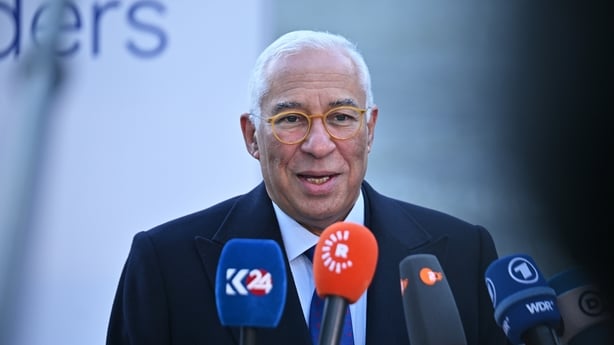The Taoiseach has cautioned against any premature response to US President Donald Trump's threat to impose tariffs on EU exports to the United States, saying that European unity was essential.
Speaking on his arrival to a leaders' meeting in Brussels, Micheál Martin said: "First of all, we have to see what happens and assess it and measure it, calibrate the impacts, and then develop our response.
"But I wouldn't do anything prematurely right now, until we see what exactly is being proposed, if something is being proposed. What is essential is that the European Union acts as one and will act as one. And I think in unity, there is strength."
The Taoiseach is attending an informal EU leaders' retreat, which is primarily focused on enhancing European defence but which has been overshadowed by President Trump's battery of tariffs against Mexico, Canada and China, and his threat to hit EU exports with further tariffs.
US President Donald Trump has said that he will pause new tariffs on Mexico for one-month after it agreed to reinforce its northern border with 10,000 National Guard members to stem the flow of illegal drugs, particularly fentanyl.
Mr Martin told reporters the EU-US relationship is the biggest economic relationship in the world "and a very significant one."
"We have managed in recent years to get inflation down. In our view, protectionism, more generally, will harm citizens no matter where they reside, and that tariffs are a negative in respect of economic development.
"We're a small, open economy. We depend on trade, and it is our view that the [European] Union has championed that, and we continue to champion that, and that Europe will work together on these issues and engage with the US in a constructive manner."
The EU has been more preoccupied with defence since Russian President Vladimir Putin invaded Ukraine in February 2022, but with Mr Trump's threats about downgrading NATO, the issue is now regarded as urgent.
Later, they will be joined by British Prime Minister Keir Starmer, - the first time a British prime minister will meet EU leaders since Brexit.
Read more:
Martin 'not opposed' to giving EIB flexibility to finance defence spending
Global stocks slump on fears of Trump tariffs impact
Antonio Costa, the new President of the European Council, the body which brings together EU prime ministers, called for a leaders' retreat.
The meeting is not a formal summit but a forum where there can be an open discussion about what the EU should be doing on defence, with a more formal summit approach in June.

There is a consensus about the threats Europe faces: A neo-colonial Russia as well as hybrid and cyber security threats.
In a letter to EU leaders, Mr Costa acknowledged that member states are responsible for their own armies but that the EU could do more when it comes to an industrial defence base, the interoperability of equipment, defence readiness and replenishing weapons that have been given to Ukraine.
There will be difficult discussions about the EU not duplicating what NATO does, whether member states should buy European capabilities, or buy what is available on the open market, namely US defence equipment.
There will also be tricky discussions about using the EU budget for defence spending, or issue joint EU bonds to boost the sector, something the Taoiseach has opposed in the past.
Ireland is one of only four non-NATO EU countries, and it spends much less on defence than most others.







